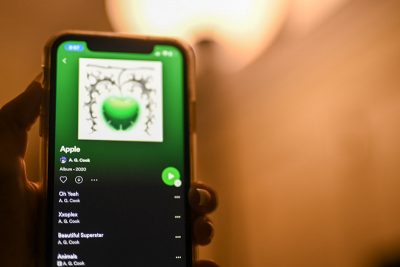Hyperpop in the last decade has risen in popularity and in quantity — artists such as Charli XCX, SOPHIE, 100 gecs and similar musicians cultivate dense, synthesized pop sounds where production is integral to the final product.

The producer behind all three of those artists’ latest releases is A. G. Cook, the founder of record label PC Music. The label has amassed a network of music creators and innovators who, as the name suggests, incorporate computerized, avant-garde sounds to their productions.
Cook stepped inside the studio himself to record his second debut album, “Apple,” which debuted Friday. The album is a follow up to his massive LP, 7G — a seven-disk behemoth with a 160-minute run time released in August.
“Apple,” a much smaller, 10-track album, transforms the producer popularized by his remixes and potent, personal musical touch into an artist continuing to find ways to experiment with music.
Making the leap to a vocalist, after solely working alongside artists since 2013, has its benefits: Cook, stylistically, has created his own aesthetic. The album’s elevated simplistic design plays off Steve Jobs’s “Apple” and the digitized world. The three preceding singles fit Cook’s visual mold — it’s not edgy, but rather clean, confidently boring cover art. And there’s something pretentious but intriguing about it.
While 7G was a smattering of both new music from Cook as well as covers of songs by other artists, “Apple” was entirely his own, which may be where the faults in the record are. While Cook has worked to ramp up music from other creators, his own work lacks the same boost and leaves much of the record devoid of concurrent themes or messaging.
“Oh Yeah,” the album’s opening track and first single, riffs off of a ‘90s love ballad — light guitars and sappy, overly simplistic lyrics and autotune — but a heavy bass and synthesized instrumentals push the song into “PC Music” territory, and it’s largely a success.
Another highlight of the record is “Beautiful Superstar,” where Cook is his most “pop-y,” almost channels a slower Charli song or one from Caroline Polachek’s discography. Its echoing vocals and layered musicality demonstrate what this album could have been.
Cook is well-known and well-versed in modern techno, but the album’s experimental tracks offer nothing new for the genre. “Xxoplex” has some promising beats within the first 30 seconds, but becomes confused and muddled in conflicting sounds and tempos that mush into something intangible and ugly. In other words, maybe this one should have been left on the GarageBand cutting-room floor.
This sharply contrasts with “Airhead,” whose initial static noise is perhaps discordant, but mellows into a chirpy, light synth track. The instrumentals are dutifully incorporated and both interesting to listen to and equally interesting to decipher — the initial beat is a cross between a xylophone and a wind chime, but it somehow works. And the fade-out reminds us, maybe too obviously, that this is a PC Music production, with that classic digital soundscape.
In the context of Cook’s other collaborations with artists, including his recent brilliant remix of Christine and the Queens’s “La vita nuova,” this album leaves so much to be desired. The funky, unique melodies that pervade his alterations on other music simply do not exist here, and it’s disappointing. The whole album breathes future potential, but not execution.
Most tracks on their own are enjoyable, but as a unit of art, they blend into one another and fall flat. Cook’s vocal performance is nothing magnificent, which adds to the charm of his character on the album and outside of the recording studio. If anything, Cook’s singing reinforces his experience more as a producer and less as an artist.
The closing track is “Apple”’s saving grace. “Lifeline” encapsulates a lot of what constitutes visionary hyperpop — experimental reimaginings of what pop music is, from lyricism to instrumentation to production.
PC Music’s roots are in SoundCloud, where experimentation and genre blending — or inventing — dominate the music industry. While Cook isn’t seeking to revolutionize electronic indie pop with “Apple,” he created a work that’s bound to quickly fade from the consciousness of his new and old fans alike. His remixes still stand as a true testament of his expertise in the hyperpop scene.














